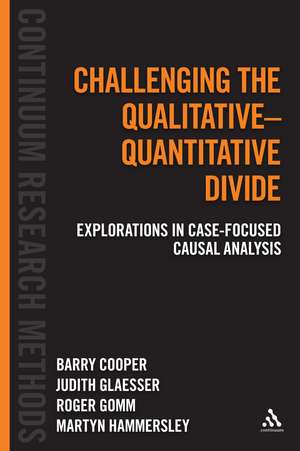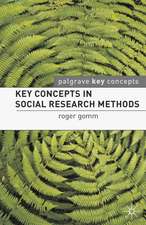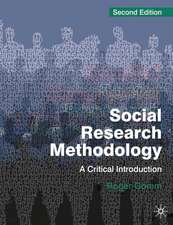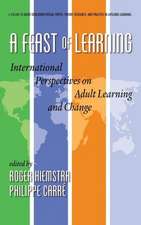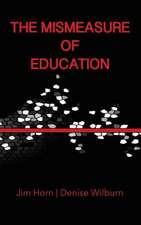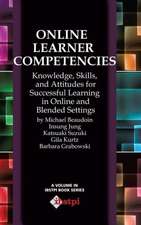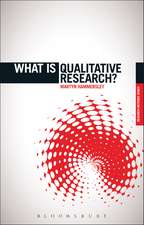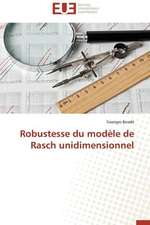Challenging the Qualitative-Quantitative Divide: Explorations in Case-focused Causal Analysis: Continuum Research Methods
Autor Professor Barry Cooper, Dr Judith Glaesser, Dr Roger Gomm, Professor Martyn Hammersleyen Limba Engleză Paperback – 7 mar 2012
| Toate formatele și edițiile | Preț | Express |
|---|---|---|
| Paperback (1) | 306.17 lei 6-8 săpt. | |
| Bloomsbury Publishing – 7 mar 2012 | 306.17 lei 6-8 săpt. | |
| Hardback (1) | 1066.39 lei 6-8 săpt. | |
| Bloomsbury Publishing – 7 mar 2012 | 1066.39 lei 6-8 săpt. |
Preț: 306.17 lei
Nou
Puncte Express: 459
Preț estimativ în valută:
58.58€ • 61.34$ • 48.59£
58.58€ • 61.34$ • 48.59£
Carte tipărită la comandă
Livrare economică 10-24 aprilie
Preluare comenzi: 021 569.72.76
Specificații
ISBN-13: 9781441114396
ISBN-10: 1441114394
Pagini: 288
Ilustrații: black & white illustrations, black & white tables, figures
Dimensiuni: 156 x 234 x 15 mm
Greutate: 0.42 kg
Editura: Bloomsbury Publishing
Colecția Continuum
Seria Continuum Research Methods
Locul publicării:London, United Kingdom
ISBN-10: 1441114394
Pagini: 288
Ilustrații: black & white illustrations, black & white tables, figures
Dimensiuni: 156 x 234 x 15 mm
Greutate: 0.42 kg
Editura: Bloomsbury Publishing
Colecția Continuum
Seria Continuum Research Methods
Locul publicării:London, United Kingdom
Caracteristici
Provides in-depth discussions of some of the difficult methodological problems in social science.
Notă biografică
Barry Cooper is Emeritus Professor of Education at Durham University, UK. From 2004-2007, he was co-editor of the British Educational Research Journal.Judith Glaesser is Senior Lecturer in the School of Education at Durham University, UK.Roger Gomm, now retired, was Lecturer in Health and Welfare at the Open University, UK. He has a long experience of ethnographic research in both the UK and internationally, and of bespoke evaluation research. Martyn Hammersley is Professor of Educational and Social Research at the Centre for Childhood, Development and Learning at The Open University. He has carried out research in the sociology of education and the sociology of the media. However, much of his work has been concerned with the methodological issues surrounding social enquiry. He has written several books, including: Reading Ethnographic Research (1991); What's Wrong with Ethnography? (1992); The Politics of Social Research (1995); Taking Sides in Social Research (1999); Educational Research, Policymaking and Practice (2002), Questioning Qualitative Inquiry (2008), and Methodology, Who Needs It? (2011).
Cuprins
Introduction Part I: Problems with Quantitative and Qualitative Research1. What's Wrong with Quantitative Research? 2. Quantitative Research on Meritocracy: The Problem of Inference from Outcomes to Opportunities 3. Qualitative Causal Analysis: Grounded Theorising and the Qualitative Survey 4. Qualitative Research and the Fallacies of Composition and Division: The Case of Ethnic Inequalities in Educational Achievement Part II: Exploring Case-Focused Approaches to Causal Analysis 5. Set Theoretic versus Correlational Methods: the Case of Ability and Educational Achievement6. Creating Typologies: Comparing Fuzzy Qualitative Comparative Analysis with Fuzzy Cluster Analysis 7. Analytic Induction versus Qualitative Comparative Analysis Conclusion References Index
Recenzii
Highly Commended - Society for Educational Studies Annual Book Prize 2013
This book does three important things. It provides a useful account of how the qualitative-quantitative divide in research methods arose and became entrenched, it sets out the various reasons why we need to move beyond this divide, and it offers a vision and a demonstration of how this can be done using an approach that combines a focus on cases with the search for the causes of the social phenomena under investigation. It combines philosophical discussion with empirical illustration in an accessible way that will make readers reconsider their ideas about how to deal with depth and breadth in social research.
This book does three important things. It provides a useful account of how the qualitative-quantitative divide in research methods arose and became entrenched, it sets out the various reasons why we need to move beyond this divide, and it offers a vision and a demonstration of how this can be done using an approach that combines a focus on cases with the search for the causes of the social phenomena under investigation. It combines philosophical discussion with empirical illustration in an accessible way that will make readers reconsider their ideas about how to deal with depth and breadth in social research.
